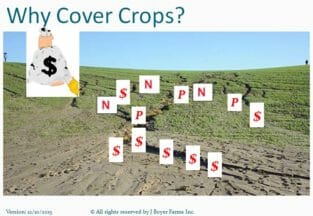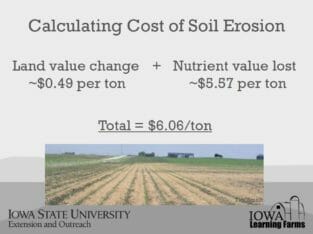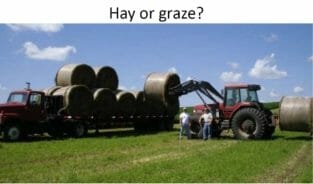Cover crops: Affordable or not?

Fred Abels shows off PFI’s newest merchandise. A wise quote from founder Dick Thompson, “Get along, but don’t go along.”
56 farmers came to the Grundy County Fair on July 20, 2016 to learn more about cover crops and soil health at our “indoor” field day. Fred Abels, a long-time PFI member and Grundy County Commissioner helped plan another great workshop with ISU Extension and Grundy County NRCS.
Dr. Jerry Hatfield started the day reminding us all about the importance of soil organic matter to protect yield during climate stress. 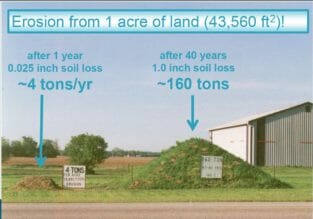 Whether we are receiving too much rain or too little having a cover crop present and reducing tillage will help our cash crops perform during extremes. A slide from Jerry’s powerpoint shows the cumulative effect of soil erosion over time.
Whether we are receiving too much rain or too little having a cover crop present and reducing tillage will help our cash crops perform during extremes. A slide from Jerry’s powerpoint shows the cumulative effect of soil erosion over time.
Jack Boyer, PFI member who farms in Reinbeck shared results of a couple on farm research trials that he’s conducted with cover crops on his farm. One of Jack’s best slides provides good context for why his biggest reason for using cover crops is to reduce soil erosion and grow roots to protect his soil long term. Saving that soil can save money lost on expensive inputs over time. Jack is testing many different cover crop scenarios on his farm. He uses them with seed corn production, testing delayed termination of cover crops prior to soybeans and has also experimented some with interseeding cover crops into standing corn early in the year.
Jamie Benning (ISU) and Liz Juchems (Iowa Learning Farms) presented next.
They shared an overview of  Iowa’s Nutrient Reduction Strategy goals and a current assessment of where we are at. Many more acres of a suite of practices are needed to really make a dent in improving Iowa’s water quality. Not just is adding practices like cover crops and no-till good for improving water quality they are also good for protecting your farm’s most important asset–the soil.
Iowa’s Nutrient Reduction Strategy goals and a current assessment of where we are at. Many more acres of a suite of practices are needed to really make a dent in improving Iowa’s water quality. Not just is adding practices like cover crops and no-till good for improving water quality they are also good for protecting your farm’s most important asset–the soil. 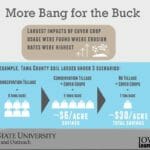 A ton of soil has been valued at $6.06 and if an average soil loss is close to 5 ton/acre there is a favorable economic return for cover crops which cost about $30/A.
A ton of soil has been valued at $6.06 and if an average soil loss is close to 5 ton/acre there is a favorable economic return for cover crops which cost about $30/A.
After a break where attendees learned about the Slake Test, a demonstration of the Soil Scan 360
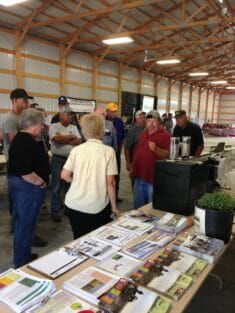
Alan Wedemeyer with NRCS shows how good soil stay intake while poor soils fall apart. “Good soil health looks like chocolate cake, poor soil health looks like cocoa powder.”
and visited the Iowa Learning Farms rainfall simulator outside we Wade Dooley shared information about cover crops on his farm. Wade’s take home was that we need to have a little different mindset about making cover crops work. He’s been experimenting with them for almost a decade and has used them in many cropping scenarios plus as livestock feed. The obvious immediate return on investment of cover crops is from livestock feed by saving on feeding stored feed.
See more pictures from Wade’s presentation on the various ways he adds cover crops to his farm.
The meeting ended with all speakers plus area farmers including Fred Abels sharing more about the details of making cover crops work on their farms.
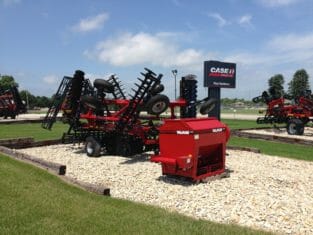
Check out this cover crop seeder at a Case dealership in Grundy Center, IA. Cover crops are hitting the mainstream.

